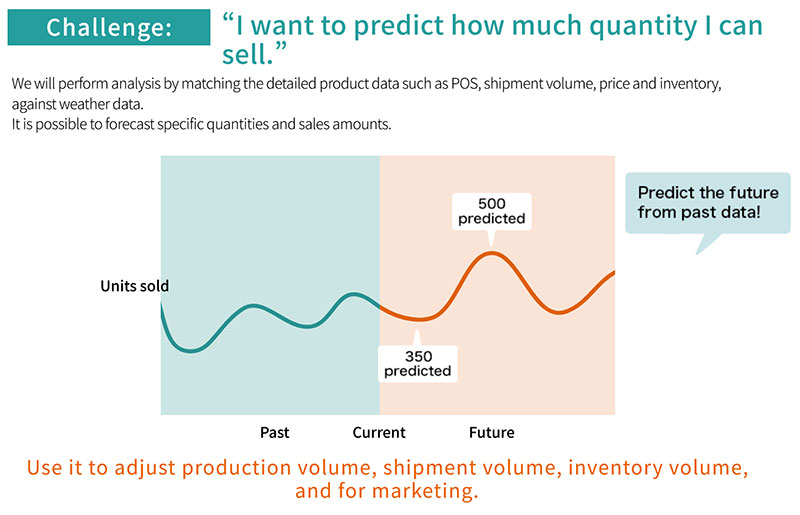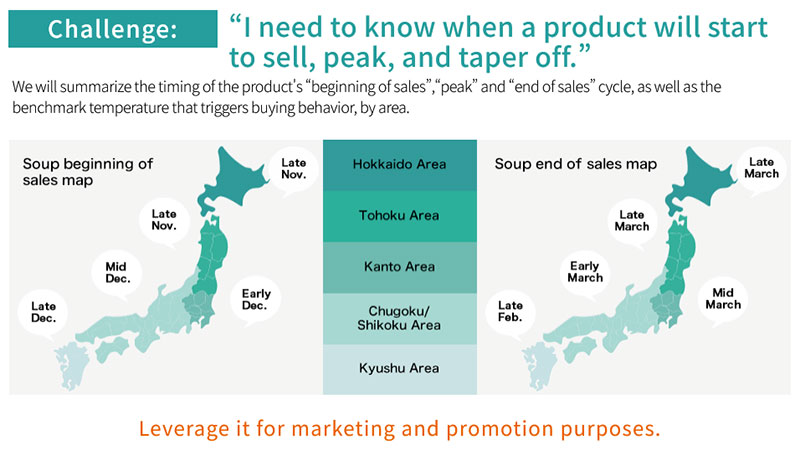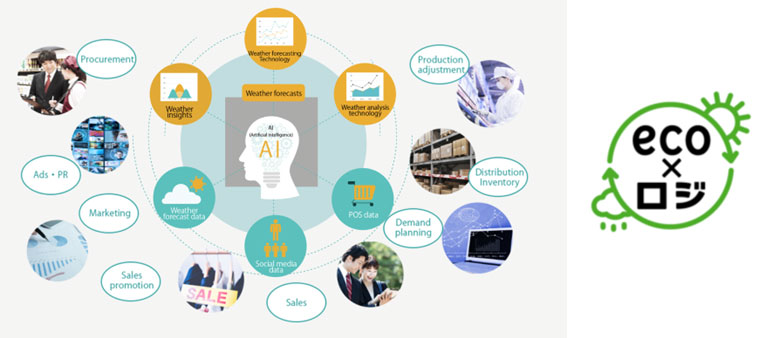Footnote
(Note 1) Example of lost opportunity: stockout of products that sell well on hot days due to lingering summer heat that lasts longer than expected.
(Note 2) The "eco×logi project" which started in full operation in April 2017, after "energy conservation logistics project with improved accuracy and shared demand forecasting" (FY2014-FY2016) subsidized by the Ministry of Economy, Trade and Industry (METI).
Provision of Product Demand Forecasting Service
Japan Weather Association
| Publication date | August 10, 2022 (Posted on May 15, 2023) |
|---|---|
| Sector | Industrial and economic activities |
Company Overview

Since its establishment in 1950, Japan Weather Association has been engaged in research, analysis, and provision of information related to weather, environment, and disaster prevention. Our greatest strength is that we have skills to combine the technology to conduct research/analysis and the technology to provide real-time information. In response to changes in the world, we aim “to create a society that is harmonized with the nature" together with our corporate and individual clients by leveraging our strengths.
Climate Change Impacts
Climate change is causing long-term changes including rising temperatures and changing precipitation patterns, as well as short-term changes including extreme climate conditions such as extreme heat waves and short-duration heavy rainfall, which cause a variety of impacts on business operations. We recognize that going forward, adapting to climate change and developing new sustainable businesses will be the driving force behind the long-term growth for companies.
Adaptation Initiatives
In order to avoid stockouts of products that sell particularly well on hot days (opportunity loss (Note 1)) due to the unexpectedly long summer and lingering heat, it is essential to predict the timing when the temperature changes and the products sell well. In response to such demand, our “product demand forecasting service” predicts the quantity of products needed in the future by analyzing big data such as weather and POS (sales data) using the latest technologies including AI.
- Visualize the correlation between weather conditions and product sales.
- Investigate and identify the relationship between weather conditions and product sales to understand which products are affected by the weather.
- Create demand forecast models for each product.
- Collect and organize the data necessary for analysis and create an analysis and demand forecasting model.
This service enables customers to make more rational and efficient decisions for manufacturing, sales planning and shipment volume. For manufacturers, the service analyzes the data of the product (shipment volume and POS) and the weather to provide demand forecast information in order to manufacture, ship, and sell the right amount at the right time (Fig. 1). For apparel manufacturers, we analyze sales data for multiple products and weather data to provide visualized information that shows the relationship between weather and product sales according to the time of year and area (Fig. 2).
Effects / Expected Benefits
We use our expertise in weather, weather forecasting technology, weather analysis technology, and AI technology to perform advanced demand forecasting, which will reduce unnecessary stock, avoid stockouts, make production planning more efficient, and maximize sales by adjusting the prices.
By sharing our forecast information across companies and units within the supply chain, it is possible to improve the efficiency of the supply chain, such as by arranging delivery trucks in response to a decrease in sales from the bad weather. This initiative is defined as the "eco×logi project (Note 2)," and is part of our initiatives to realize a sustainable society (Fig. 3). Specific examples are stated below.
| Items | Details |
|---|---|
| Chilled Chinese noodles' soup | Improved the accuracy of demand forecasting by incorporating sensible temperature. Succeeded in reducing the stock of chilled noodle soup, which is often wasted at the end of summer. |
| Tofu | Indexed tofu in accordance with the demand. Production control became more efficient and food loss was reduced. |
| Beverages | Succeeded in avoiding shortages by making the decision to increase production two weeks in advance based on demand forecasting. |
| Vessels (logistics for beverage manufacturers) | Succeeded in shifting to mass transportation using vessels by accelerating transportation plans based on demand forecasting. |
Thus, demand forecasting for products can reduce food loss that comes from overproduction and waste of products. It also makes it possible to transport and supply products in a structured plan and reduce unnecessary CO₂ emissions.




